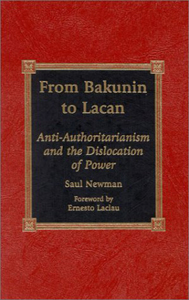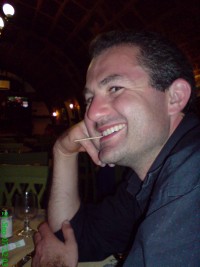Anarchism is a political philosophy and movement that is against all forms of authority and seeks to abolish the institutions it claims maintain unnecessary coercion and hierarchy, typically including the state and capitalism. Anarchism advocates for the replacement of the state with stateless societies and voluntary free associations. As a historically left-wing movement, this reading of anarchism is placed on the farthest left of the political spectrum, usually described as the libertarian wing of the socialist movement.
Individualist anarchism is the branch of anarchism that emphasizes the individual and their will over external determinants such as groups, society, traditions, and ideological systems. Although usually contrasted with social anarchism, both individualist and social anarchism have influenced each other. Mutualism, an economic theory sometimes considered a synthesis of communism and property, has been considered individualist anarchism and other times part of social anarchism. Many anarcho-communists regard themselves as radical individualists, seeing anarcho-communism as the best social system for the realization of individual freedom. Some anarcho-capitalists claim anarcho-capitalism is part of the individualist anarchist tradition, while others disagree and claim individualist anarchism is only part of the socialist movement and part of the libertarian socialist tradition. Economically, while European individualist anarchists are pluralists who advocate anarchism without adjectives and synthesis anarchism, ranging from anarcho-communist to mutualist economic types, most American individualist anarchists of the 19th century advocated mutualism, a libertarian socialist form of market socialism, or a free-market socialist form of classical economics. Individualist anarchists are opposed to property that violates the entitlement theory of justice, that is, gives privilege due to unjust acquisition or exchange, and thus is exploitative, seeking to "destroy the tyranny of capital, — that is, of property" by mutual credit.

Johann Kaspar Schmidt, known professionally as Max Stirner, was a German post-Hegelian philosopher, dealing mainly with the Hegelian notion of social alienation and self-consciousness. Stirner is often seen as one of the forerunners of nihilism, existentialism, psychoanalytic theory, postmodernism and individualist anarchism.
The history of anarchism is ambiguous, primarily due to the ambiguity of anarchism itself. Scholars find it hard to define or agree on what anarchism means, which makes outlining its history difficult. There is a range of views on anarchism and its history. Some feel anarchism is a distinct, well-defined 19th and 20th century movement while others identify anarchist traits long before first civilisations existed.
Anarchist economics is the set of theories and practices of economic activity within the political philosophy of anarchism. Many anarchists are anti-authoritarian and anti-capitalist, with anarchism usually referred to as a form of libertarian socialism, i.e. a stateless system of socialism. Anarchists support personal property and oppose capital concentration, interest, monopoly, private ownership of productive property such as the means of production, profit, rent, usury and wage slavery which are viewed as inherent to capitalism.
The nature of capitalism is criticized by left-wing anarchists, who reject hierarchy and advocate stateless societies based on non-hierarchical voluntary associations. Anarchism is generally defined as the libertarian philosophy which holds the state to be undesirable, unnecessary and harmful as well as opposing authoritarianism, illegitimate authority and hierarchical organization in the conduct of human relations. Capitalism is generally considered by scholars to be an economic system that includes private ownership of the means of production, creation of goods or services for profit or income, the accumulation of capital, competitive markets, voluntary exchange and wage labor, which have generally been opposed by most anarchists historically. Since capitalism is variously defined by sources and there is no general consensus among scholars on the definition nor on how the term should be used as a historical category, the designation is applied to a variety of historical cases, varying in time, geography, politics and culture.
Anarchism is generally defined as the political philosophy which holds the state to be undesirable, unnecessary and harmful as well as opposing authority and hierarchical organization in the conduct of human relations. Proponents of anarchism, known as anarchists, advocate stateless societies based on non-hierarchical voluntary associations. While anarchism holds the state to be undesirable, unnecessary and harmful, opposition to the state is not its central or sole definition. Anarchism can entail opposing authority or hierarchy in the conduct of all human relations.
The law of equal liberty is the fundamental precept of liberalism and socialism. Stated in various ways by many thinkers, it can be summarized as the view that all individuals must be granted the maximum possible freedom as long as that freedom does not interfere with the freedom of anyone else. While socialists have been hostile to liberalism, which is accused of "providing an ideological cover for the depredation of capitalism", scholars have stated that "the goals of liberalism are not so different from those of the socialists", although this similarity in goals has been described as being deceptive due to the different meanings liberalism and socialism give to liberty, equality and solidarity, including the meaning, implications and norms of equal liberty derived from it.
The following outline is provided as an overview of and topical guide to anarchism:

From Bakunin to Lacan: Anti-Authoritarianism and the Dislocation of Power is a book on political philosophy by Saul Newman, published in 2001. It investigates the essential characteristics of anarchist theory, which holds that government and hierarchy are undesirable forms of social organisation. Newman seeks to move beyond the limitations these characteristics imposed on classical anarchism by using concepts from post-structuralist thought.
Contemporary anarchism within the history of anarchism is the period of the anarchist movement continuing from the end of World War II and into the present. Since the last third of the 20th century, anarchists have been involved in anti-globalisation, peace, squatter and student protest movements. Anarchists have participated in armed revolutions such as in those that created the Makhnovshchina and Revolutionary Catalonia, and anarchist political organizations such as the International Workers' Association and the Industrial Workers of the World have existed since the 20th century. Within contemporary anarchism, the anti-capitalism of classical anarchism has remained prominent.
Anarchism: A Documentary History of Libertarian Ideas is a three-volume anthology of anarchist writings edited by historian Robert Graham. The anthology is published by Black Rose Books. Each selection is introduced by Graham, placing each author and selection in their historical and ideological context. The focus of the anthology is on the origins and development of anarchist ideas; it is not a documentary history of the world's anarchist movements, although the selections are geographically diverse.
The relation between anarchism and Friedrich Nietzsche has been ambiguous. Even though Nietzsche criticized anarchists, his thought proved influential for many of them. As such "[t]here were many things that drew anarchists to Nietzsche: his hatred of the state; his disgust for the mindless social behavior of 'herds'; his anti-Christianity; his distrust of the effect of both the market and the State on cultural production; his desire for an 'übermensch'—that is, for a new human who was to be neither master nor slave".
Social anarchism, also known as left-wing anarchism or socialist anarchism, is the branch of anarchism that sees liberty and social equality as interrelated.
Insurrectionary anarchism is a revolutionary theory and tendency within the anarchist movement that emphasizes insurrection as a revolutionary practice. It is critical of formal organizations such as labor unions and federations that are based on a political program and periodic congresses. Instead, insurrectionary anarchists advocate informal organization and small affinity group based organization. Insurrectionary anarchists put value in attack, permanent class conflict and a refusal to negotiate or compromise with class enemies.
Anti-statism is any approach to social, economic or political philosophy that rejects statism. An anti-statist is one who opposes intervention by the state into personal, social and economic affairs. In anarchism, this is characterized by a complete rejection of all involuntary hierarchical rulership.
Collectivist anarchism, also called anarchist collectivism and anarcho-collectivism, is an anarchist school of thought that advocates the abolition of both the state and private ownership of the means of production. In their place, it envisions both the collective ownership of the means of production and the entitlement of workers to the fruits of their own labour, which would be ensured by a societal pact between individuals and collectives. Collectivists considered trade unions to be the means through which to bring about collectivism through a social revolution, where they would form the nucleus for a post-capitalist society.
Carl Levy is professor of politics at Goldsmiths College, University of London. He is a specialist in the history of modern Italy and the theory and history of anarchism.
Anarchism and libertarianism, as broad political ideologies with manifold historical and contemporary meanings, have contested definitions. Their adherents have a pluralistic and overlapping tradition that makes precise definition of the political ideology difficult or impossible, compounded by a lack of common features, differing priorities of subgroups, lack of academic acceptance, and contentious historical usage.


